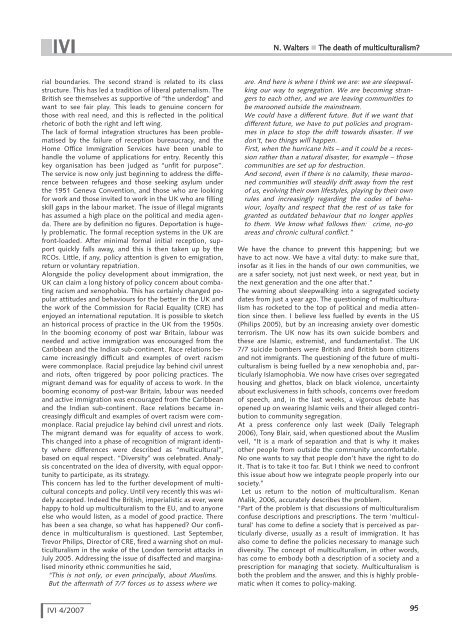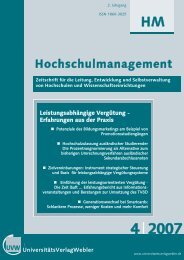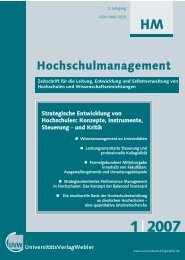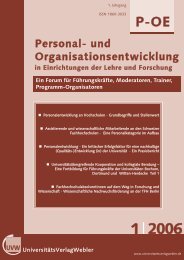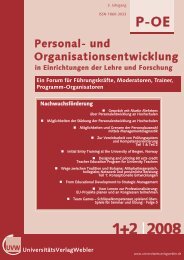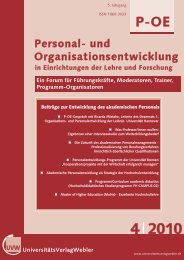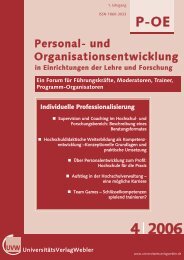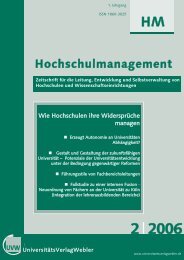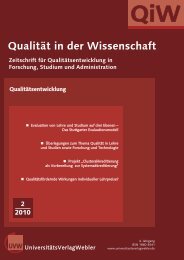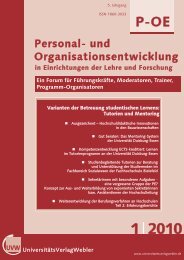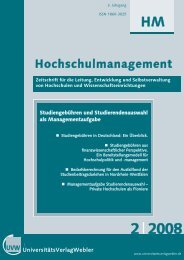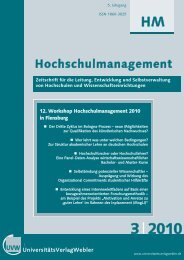Heft 4/2007 - UniversitätsVerlagWebler
Heft 4/2007 - UniversitätsVerlagWebler
Heft 4/2007 - UniversitätsVerlagWebler
Sie wollen auch ein ePaper? Erhöhen Sie die Reichweite Ihrer Titel.
YUMPU macht aus Druck-PDFs automatisch weboptimierte ePaper, die Google liebt.
IVI<br />
N. Walters • The death of multiculturalism?<br />
rial boundaries. The second strand is related to its class<br />
structure. This has led a tradition of liberal paternalism. The<br />
British see themselves as supportive of “the underdog” and<br />
want to see fair play. This leads to genuine concern for<br />
those with real need, and this is reflected in the political<br />
rhetoric of both the right and left wing.<br />
The lack of formal integration structures has been problematised<br />
by the failure of reception bureaucracy, and the<br />
Home Office Immigration Services have been unable to<br />
handle the volume of applications for entry. Recently this<br />
key organisation has been judged as “unfit for purpose”.<br />
The service is now only just beginning to address the difference<br />
between refugees and those seeking asylum under<br />
the 1951 Geneva Convention, and those who are looking<br />
for work and those invited to work in the UK who are filling<br />
skill gaps in the labour market. The issue of illegal migrants<br />
has assumed a high place on the political and media agenda.<br />
There are by definition no figures. Deportation is hugely<br />
problematic. The formal reception systems in the UK are<br />
front-loaded. After minimal formal initial reception, support<br />
quickly falls away, and this is then taken up by the<br />
RCOs. Little, if any, policy attention is given to emigration,<br />
return or voluntary repatriation.<br />
Alongside the policy development about immigration, the<br />
UK can claim a long history of policy concern about combating<br />
racism and xenophobia. This has certainly changed popular<br />
attitudes and behaviours for the better in the UK and<br />
the work of the Commission for Racial Equality (CRE) has<br />
enjoyed an international reputation. It is possible to sketch<br />
an historical process of practice in the UK from the 1950s.<br />
In the booming economy of post war Britain, labour was<br />
needed and active immigration was encouraged from the<br />
Caribbean and the Indian sub-continent. Race relations became<br />
increasingly difficult and examples of overt racism<br />
were commonplace. Racial prejudice lay behind civil unrest<br />
and riots, often triggered by poor policing practices. The<br />
migrant demand was for equality of access to work. In the<br />
booming economy of post-war Britain, labour was needed<br />
and active immigration was encouraged from the Caribbean<br />
and the Indian sub-continent. Race relations became increasingly<br />
difficult and examples of overt racism were commonplace.<br />
Racial prejudice lay behind civil unrest and riots.<br />
The migrant demand was for equality of access to work.<br />
This changed into a phase of recognition of migrant identity<br />
where differences were described as “multicultural”,<br />
based on equal respect. “Diversity” was celebrated. Analysis<br />
concentrated on the idea of diversity, with equal opportunity<br />
to participate, as its strategy.<br />
This concern has led to the further development of multicultural<br />
concepts and policy. Until very recently this was widely<br />
accepted. Indeed the British, imperialistic as ever, were<br />
happy to hold up multiculturalism to the EU, and to anyone<br />
else who would listen, as a model of good practice. There<br />
has been a sea change, so what has happened? Our confidence<br />
in multiculturalism is questioned. Last September,<br />
Trevor Philips, Director of CRE, fired a warning shot on multiculturalism<br />
in the wake of the London terrorist attacks in<br />
July 2005. Addressing the issue of disaffected and marginalised<br />
minority ethnic communities he said,<br />
“This is not only, or even principally, about Muslims.<br />
But the aftermath of 7/7 forces us to assess where we<br />
are. And here is where I think we are: we are sleepwalking<br />
our way to segregation. We are becoming strangers<br />
to each other, and we are leaving communities to<br />
be marooned outside the mainstream.<br />
We could have a different future. But if we want that<br />
different future, we have to put policies and programmes<br />
in place to stop the drift towards disaster. If we<br />
don’t, two things will happen.<br />
First, when the hurricane hits – and it could be a recession<br />
rather than a natural disaster, for example – those<br />
communities are set up for destruction.<br />
And second, even if there is no calamity, these marooned<br />
communities will steadily drift away from the rest<br />
of us, evolving their own lifestyles, playing by their own<br />
rules and increasingly regarding the codes of behaviour,<br />
loyalty and respect that the rest of us take for<br />
granted as outdated behaviour that no longer applies<br />
to them. We know what follows then: crime, no-go<br />
areas and chronic cultural conflict.”<br />
We have the chance to prevent this happening; but we<br />
have to act now. We have a vital duty: to make sure that,<br />
insofar as it lies in the hands of our own communities, we<br />
are a safer society, not just next week, or next year, but in<br />
the next generation and the one after that.”<br />
The warning about sleepwalking into a segregated society<br />
dates from just a year ago. The questioning of multiculturalism<br />
has rocketed to the top of political and media attention<br />
since then. I believe less fuelled by events in the US<br />
(Philips 2005), but by an increasing anxiety over domestic<br />
terrorism. The UK now has its own suicide bombers and<br />
these are Islamic, extremist, and fundamentalist. The UK<br />
7/7 suicide bombers were British and British born citizens<br />
and not immigrants. The questioning of the future of multiculturalism<br />
is being fuelled by a new xenophobia and, particularly<br />
Islamophobia. We now have crises over segregated<br />
housing and ghettos, black on black violence, uncertainty<br />
about exclusiveness in faith schools, concerns over freedom<br />
of speech, and, in the last weeks, a vigorous debate has<br />
opened up on wearing Islamic veils and their alleged contribution<br />
to community segregation.<br />
At a press conference only last week (Daily Telegraph<br />
2006), Tony Blair, said, when questioned about the Muslim<br />
veil, “It is a mark of separation and that is why it makes<br />
other people from outside the community uncomfortable.<br />
No one wants to say that people don’t have the right to do<br />
it. That is to take it too far. But I think we need to confront<br />
this issue about how we integrate people properly into our<br />
society.”<br />
Let us return to the notion of multiculturalism. Kenan<br />
Malik, 2006, accurately describes the problem.<br />
“Part of the problem is that discussions of multiculturalism<br />
confuse descriptions and prescriptions. The term 'multicultural'<br />
has come to define a society that is perceived as particularly<br />
diverse, usually as a result of immigration. It has<br />
also come to define the policies necessary to manage such<br />
diversity. The concept of multiculturalism, in other words,<br />
has come to embody both a description of a society and a<br />
prescription for managing that society. Multiculturalism is<br />
both the problem and the answer, and this is highly problematic<br />
when it comes to policy-making.<br />
IVI 4/<strong>2007</strong><br />
95


